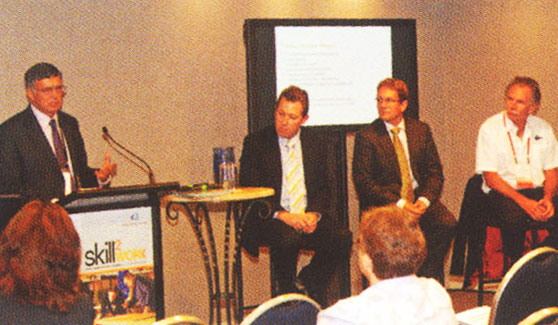Greening the workforce: the case for sustainable skills
 At my first Group Training National Conference, I was delighted to be invited to chair a session titled ‘Greening Group Training’.Many organisations are interested in how they can become more sustainable and I was pleased to see Group Training Australia (GTA) demonstrating leadership by featuring a session on how group training organizations (GTOs) are responding to the needs of industry and apprentices, and also incorporating sustainability policies and practices into their own businesses.
At my first Group Training National Conference, I was delighted to be invited to chair a session titled ‘Greening Group Training’.Many organisations are interested in how they can become more sustainable and I was pleased to see Group Training Australia (GTA) demonstrating leadership by featuring a session on how group training organizations (GTOs) are responding to the needs of industry and apprentices, and also incorporating sustainability policies and practices into their own businesses.
The panel session featured excellent examples of leadership in fostering skills for sustainability and introducing sustainable business policies and practices across a range of metropolitan, regional and remote GTOs. It featured WPC Group (Nicholas Wyman), Central West Group Apprentices (Ben Bardon) and Group Training Northern Territory (Mike Harrison).
Moving to a more sustainable economy will require changes to the ways Australians live, work and do business. These changes will create opportunities as well as challenges.
Aside from the benefits of cleaner, more efficient workplaces and homes, sustainable technologies and practices adopted by individuals, workplaces and communities will boost productivity and support job growth.
If Australia is to take advantage of these opportunities, existing workers across a range of industries, as well as VET students, will need to upskill or reskill in skills for sustainability.
The training sector will playa key role in the provision of these skills. In particular, apprentices will need new skills to deliver services like water-wise plumbing and irrigation systems, recycled grey water and solar installations, Group training will playa key role by providing employers with apprentices that meet their specific needs for sustainable business practices.
To build the capacity of the training sector to deliver these skills, the Australian and state and territory governments negotiated a Green Skills Agreement in December 2009.
The key objectives of the Agreement are to embed skills for sustainability in Training Packages, and to ensure that all VET teachers have the expertise to teach these skills effectively. The Agreement will also develop strategies to assist workers most likely to need upskilling.
The Federal Department of Education, Employment and Workplace Relations hosts a Green Skills Agreement Implementation Group to ensure that the Agreement incorporates the perspectives of the VET sector and key industry groups.
More information on the Agreement is available at: www.deewr.gov.au/skillsforsustainability
The Green Skills Agreement, together with the complementary initiatives of GTOs, will ensure that skills for sustainability are an integral part of all vocational education and training.

